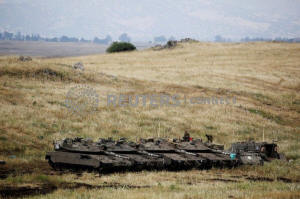|
Syria vows to recover Golan as Trump
policy shift draws criticism
 Send a link to a friend
Send a link to a friend
 [March 22, 2019]
BEIRUT (Reuters) - The Syrian
government vowed to recover the Israeli-occupied Golan Heights as its
allies and enemies alike condemned U.S. President Donald Trump on Friday
for moving to recognize Israeli sovereignty over the territory seized in
war. [March 22, 2019]
BEIRUT (Reuters) - The Syrian
government vowed to recover the Israeli-occupied Golan Heights as its
allies and enemies alike condemned U.S. President Donald Trump on Friday
for moving to recognize Israeli sovereignty over the territory seized in
war.
Trump's statement on Thursday marked a dramatic shift in U.S. policy
over the status of a disputed area that Israel captured from Syria in
the 1967 Middle East conflict and annexed in 1981 - a move not
recognized internationally.
Against this backdrop of hostility toward the U.S. move, Secretary of
State Mike Pompeo landed in Beirut after visiting Israel on Friday. He
is expected to pile pressure on the government to curb the influence of
the Iran-backed Hezbollah.
The declaration is the latest in a series of moves that have fueled
anger among Israel's Arab enemies and U.S.-allied Arabs.
It follows the U.S. recognition in December 2017 of Jerusalem as
Israel's capital - a decision that also drew international criticism as
the disputed city's status remains at the heart of the
Israel-Palestinian conflict.

Russia, an ally of President Bashar al-Assad with forces in Syria, said
Trump's comments risked seriously destabilizing the region and expressed
hope the statement was just declaratory.
Iran, Assad's main regional ally and which also has forces in Syria,
condemned the statement as illegal and unacceptable.
Turkey, a U.S.-allied state and an adversary of Damascus, also
criticized the move, saying it had brought the Middle East to the edge
of a new crisis and the legitimization of the occupation of the Golan
Heights could not be allowed.
Damascus said the Golan Heights would remain "Syrian, Arab" and Trump
had shown contempt for international law.
"The Syrian nation is more determined to liberate this precious piece of
Syrian national land through all available means," the Syrian government
said.
Though the Golan Heights had been calm for decades, the frontier has
reemerged as a flashpoint for regional tensions during the Syrian war.
Last May, Israel accused Iran's Revolutionary Guards of launching a
rocket salvo into its territory from the Syrian side of the frontier.
Israel, which has mounted numerous air strikes against what it has
called Iran-backed targets in Syria, has demanded Russia keep forces
allied to Tehran away from the frontier.
[to top of second column]
|

Israeli soldiers stand on tanks near the Israeli side of the border
with Syria in the Israeli-occupied Golan Heights, Israel May 9,
2018. REUTERS/Amir Cohen/File Photo

The Syrian side of the frontier was held by rebel forces for years
until pro-government forces recovered it in July.
POMPEO TO FLAG HEZBOLLAH CONCERNS
Turkish President Tayyip Erdogan said: "we cannot allow the
legitimization of the occupation of the Golan Heights".
The Arab League, which suspended Syria in 2011 after the start of
its civil war, said Trump's comment paved "the way for official
American recognition" of Israeli sovereignty over the Golan Heights
and said it "completely beyond international law".
Trump's statement has given a boost to Israeli Prime Minister
Benjamin Netanyahu in the middle of his re-election campaign.
Netanyahu has praised Trump for "making history" with the statement.
In Lebanon, Pompeo is expected to flag U.S. concerns about
Hezbollah's growing role in government: the group has three
ministers in government and together with its allies controls more
than 70 of parliament's 128 seats.
The United States is a major donor to the Lebanese army but its
allies, including the Sunni Prime Minister Saad al-Hariri, have been
weakened as Iran's role has deepened through Lebanon, Iraq and Syria
and Saudi influence has retreated.
Washington has reintroduced sanctions on Iran and imposed new
financial sanctions on Hezbollah which Lebanon's Hezbollah-aligned
president, Michel Aoun, said on Thursday were hurting all Lebanese.

(Reporting by Ali Abdelaty in Cairo/Tom Perry in Beirut, Maria
Kiselyova in Moscow, and Parisa Hafezi in Dubai, Yousef Saba in
Cairo, Ezgi Erkoyun and Ali Kucukgocmen in Istanbul; Writing by Tom
Perry; Editing by Simon Cameron-Moore, Darren Schuettler and Raissa
Kasolowsky and Samia Nakhoul)
[© 2019 Thomson Reuters. All rights
reserved.]
Copyright 2019 Reuters. All rights reserved. This material may not be published,
broadcast, rewritten or redistributed.
Thompson Reuters is solely responsible for this content. |